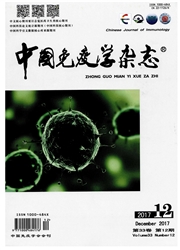

 中文摘要:
中文摘要:
目的:研究TLR4信号通路活化对 polyI:C诱导人肝癌细胞系H7402凋亡的影响,并分析其可能的作用机制.方法:用TLR4激动剂LPS处理H7402细胞 24 h后,转染polyI:C刺激24 h,然后利用流式细胞术检测细胞凋亡,荧光定量PCR检测凋亡基因及胞内RNA模式识别受体TLR3、MDA5、RIG-I和LGP2的表达,Western blot检测识别受体的蛋白表达水平.结果:LPS预处理,减弱了polyI:C诱导H7402细胞凋亡的作用.同时,促凋亡基因Noxa的表达水平降低.在此过程中polyI:C的胞内识别受体RIG-I、MDA5的基因和蛋白水平表达下调.结论:LPS可能通过降低H7402细胞内dsRNA识别受体的表达,抑制了polyI:C诱导H7402细胞凋亡的作用.
 英文摘要:
英文摘要:
Objective:To investigate the influence of TLR4 signaling activation on polyI:C-induced apoptosis of H7402 cells and the mechanisms involved in this process. Methods: After pre-treatment with TLR4 ligand LPS for 24h, polyI : C was transfected into H7402 cells. After an additional 24hs, FACS was used to evaluate the apoptosis rate, and real-time quantitive PCR was performed to analyze the expression of apoptotic genes and RNA-sensing pattern recognition receptors (PRRs) , including TLR3, MDA5, RIG-I and LGP2. The protein level of MDA5 and RIG-I was measured by Western blot. Results: LPS pre-treatment could inhibit polyI:C-induced the apoptosis of H7402 cells. Further research showed that the expression of RIG-I, MDA5 as well as the pro-apoptotic gene Noxa was decreased in the process. Conclusion: LPS pre-treatment lead to the reduction of intracellular RNA-sensing PRRs, and then inhibite polyI:C-induced the apoptosis of H7402 cells.
 同期刊论文项目
同期刊论文项目
 同项目期刊论文
同项目期刊论文
 HMBOX1, homeobox transcription factor, negatively regulates interferon-gamma production in natural k
HMBOX1, homeobox transcription factor, negatively regulates interferon-gamma production in natural k 期刊信息
期刊信息
